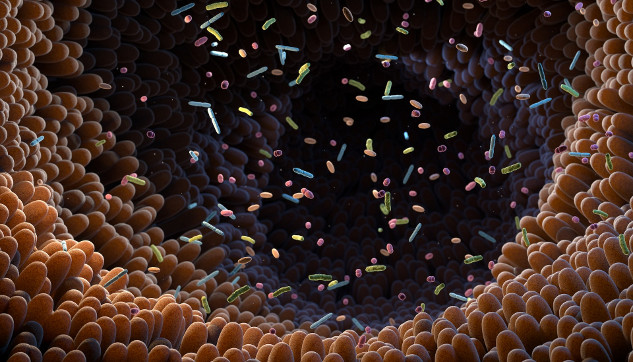 The human gut is home to communities of microbes, bacteria and fungi. (Shutterstock)
The human gut is home to communities of microbes, bacteria and fungi. (Shutterstock)
The human body is a complex organism, made up of trillions of cells. But not all of them are human — about half of them are fungi, microbes and bacteria. Scientists are starting to understand how and why these communities — referred to as microbiomes — are crucial to the functioning of various body systems.
In this episode of The Conversation Weekly, we speak to three experts who study the gut microbiome: a gastroenterologist, a neuroscientist and a biological engineer.
Their research considers how these microbiomes are important, what the relationship is between microbiomes and well being, and how synthetically engineered microorganisms promise new forms of therapies.
Partners in health
Chris Damman is a gastroenterologist and clinical associate professor at the University of Washington, Wash. Damman investigates how microbiomes in the gut — the digestive system from start to finish — communicate with other body systems. He looks at the gut-brain axis, specifically.
Get The Latest By Email
Damman points out the importance of the gut microbiome, which “plays an incredibly important role in digesting our food. We have powerful enzymes that our pancreas and our liver and our stomach, our salivary glands make.” he explains.
“But the enzymes that are our bodies can produce only do so much. So the last part of the small intestine, um, and the large intestine, the colon… it’s there that the microbiome is like our partners in health, converting fibre into things like butyrate and other short chain fatty acids.”
Studying the composition and balance of the gut microbiome is starting to reveal connections between it and various neurological conditions. Andrea Merchak, an incoming postdoctoral scholar at the University of Florida, studies the gut biome as it affects and is affected by various conditions.
“Somebody with multiple sclerosis is going to have a different microbiome from when they’re perfectly healthy through diagnosis and then through late stages of disease, that microbiome is gonna change.”
Merchak points out that because of the progression of the condition, multiple sclerosis allows scientists to investigate the gut-brain axis.
“It happens over a really long period of time, which means that we have a really long time to intervene, and a really long time to try and stop what’s going on,” Merchak says. “When a person’s first diagnosed, they’re not necessarily at the point of severe disability yet… We can see it early and we can try and stop it.”
Engineering the biome
As scientists learn more about the gut biome and its relationship to disease, they’re also starting to figure out ways to impact the gut biome’s composition to produce different, and more healthful, outcomes.
Tae Seok Moon, a biological engineer at Washington University at St. Louis, Mo., looks at how synthetic biology can be employed within the gut. He is developing sensors that can help adjust the composition of the gut biome and various microbe communities within it.
“What I want to do is, there are some enzyme that break down or synthesize serotonin,” he says. “In response to the serotonin level, bacteria would have the ability to control the concentration of serotonin by producing an enzyme that breakdown serotonin if the serotonin level is too high.”
Scientists are looking at how manipulating the gut biome can help address various conditions, but Merchak points out that it’s not as straightforward as it sounds.
“We know that if you change what you eat, it changes the composition of your gut microbiome. And so ultimately, if we find beneficial bacteria that we think is going to be promising for a wide swath of people, generally, that’s going to come with a dietary change in order to maintain those populations.”
About The Author
Nehal El-Hadi, Science + Technology Editor & Co-Host of The Conversation Weekly Podcast, The Conversation and Mend Mariwany, Producer, The Conversation Weekly
This article is republished from The Conversation under a Creative Commons license. Read the original article.
books_health







